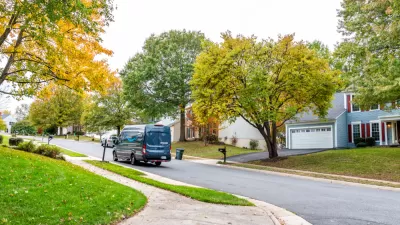The ranks of states considering or taking steps to override local control to allow new density in the residential neighborhoods of cities has swelled once again, this time with a state senator in Nebraska pitching statewide legislation.

Nebraska State Senator Matt Hansen (D-Lincoln) introduced new legislation to kickoff the 2020 legislative session, proposing LB 794, or the Missing Middle Housing Act.
The text of the bill [pdf] charts a new path for planning history by first referencing 20th century planning paradigms:
Following World War II, municipal zoning codes, ordinances, and regulations in Nebraska and throughout the United States have prioritized detached single-family homes and mid-rise to high-rise apartment buildings over other forms of housing stock;
Here's where the bill makes the case for a new approach to housing and zoning:
Amending municipal zoning codes and ordinances to permit varied types of housing stock will provide greater availability of affordable housing, increase residential density, promote more efficient and effective land use, and create conditions for successful mass transit, bikeability, walkability, and affordability in residential neighborhoods.
If passed, the bill would mandate every city with more than 5,000 people (i.e., including metropolitan class, primary class, and first class cities) in the state to allow missing middle housing in areas previously zoned exclusively for single-family detached residential. The bill is also careful to mention repeatedly that opening single-family zoning to missing middle housing does not mean that single-family housing will be blocked from new construction.
Hansen, a self-proclaimed Millennial, took to Twitter to describe the need for the bill, and referenced a 2017 Washington Post article by Katherine Shaver to build the case.
First day back in the #NELeg session, and I introduced my first four bills, including #LB794 the Missing Middle Housing Act.
What is "missing middle housing"? Quite simply, its everything between single family homes and large scale apartment complexes. pic.twitter.com/RIrWCrqfrX— Matt Hansen (@MattHansenNE) January 8, 2020
While media coverage of the new bill has been scant so far, local television station KOLN/KGIN covered the announcement of the bill, and interviewed Hansen on the bill. Hansen mentions a study by the Urban Affairs Committee of the State Senate into the issue previous to the new bill.
After Oregon adopted a similar law in 2019, several states have proposed new laws that would override local control of single-family housing to increase housing development options in cities in the name of affordable housing. California, Virginia, Maryland, and now Nebraska are currently considering such bills.
FULL STORY: Proposed Affordable Housing Bill

Alabama: Trump Terminates Settlements for Black Communities Harmed By Raw Sewage
Trump deemed the landmark civil rights agreement “illegal DEI and environmental justice policy.”

Study: Maui’s Plan to Convert Vacation Rentals to Long-Term Housing Could Cause Nearly $1 Billion Economic Loss
The plan would reduce visitor accommodation by 25% resulting in 1,900 jobs lost.

Why Should We Subsidize Public Transportation?
Many public transit agencies face financial stress due to rising costs, declining fare revenue, and declining subsidies. Transit advocates must provide a strong business case for increasing public transit funding.

Paris Bike Boom Leads to Steep Drop in Air Pollution
The French city’s air quality has improved dramatically in the past 20 years, coinciding with a growth in cycling.

Why Housing Costs More to Build in California Than in Texas
Hard costs like labor and materials combined with ‘soft’ costs such as permitting make building in the San Francisco Bay Area almost three times as costly as in Texas cities.

San Diego County Sees a Rise in Urban Coyotes
San Diego County experiences a rise in urban coyotes, as sightings become prevalent throughout its urban neighbourhoods and surrounding areas.
Urban Design for Planners 1: Software Tools
This six-course series explores essential urban design concepts using open source software and equips planners with the tools they need to participate fully in the urban design process.
Planning for Universal Design
Learn the tools for implementing Universal Design in planning regulations.
Smith Gee Studio
Alamo Area Metropolitan Planning Organization
City of Santa Clarita
Institute for Housing and Urban Development Studies (IHS)
City of Grandview
Harvard GSD Executive Education
Toledo-Lucas County Plan Commissions
Salt Lake City
NYU Wagner Graduate School of Public Service





























